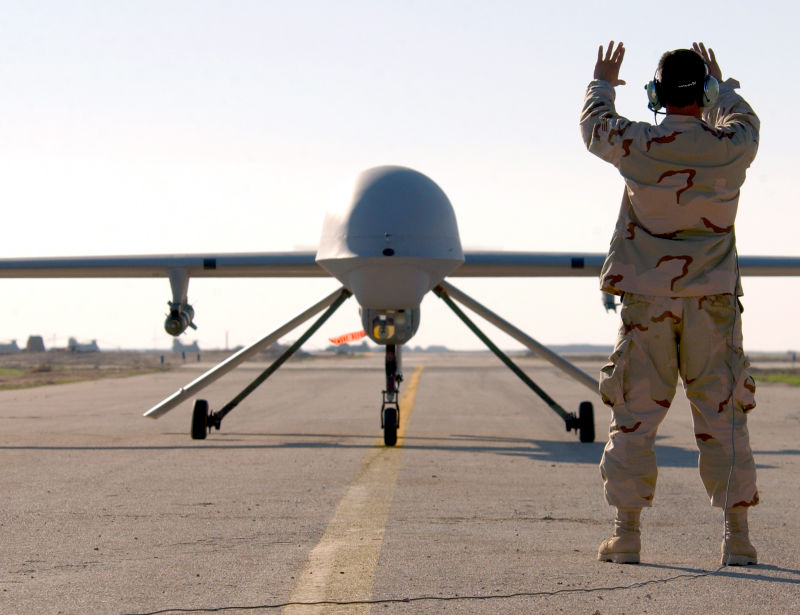By Courtney Kayser, April 17, 2018
Rachel Stohl, Managing Director of the Stimson Center’s Conventional Defense Program, will join the Center for Security Policy Studies (CSPS) as the final Distinguished Speaker of the semester on Friday, April 20th from 4:30 pm – 6:00 pm in Founders Hall Room 113 (Arlington Campus) with a no-host happy hour to follow
The use of drones in conflict, and the rules and regulations surrounding this usage are hotly debated issues in American politics. Transparency, accountability, chains of command all play a role in how and when the U.S. government utilizes drones – and these are not consistent or clear across time. Rachel Stohl’s work on drones highlights President Trump’s willingness to be laxer with restraints imposed during the Obama administration. Beyond Afghanistan and Iraq, drones have been used in Syria, Yemen, and Somalia. The Trump administration has granted more authority to the CIA to execute these strikes and lowered the threshold for acceptable civilian casualties and has undone much of the work for transparency and accountability regarding the US drone program.
The usage of drones is shrouded in secrecy, and there is limited accountability and high levels of legal ambiguity, especially since the technology is still relatively new to the battlefield. The public lacks understanding as to how targets are chosen, and the secrecy surrounding the program makes it nigh impossible for the public to assess the benefits and costs of its drone program. As such, the number of civilians killed, how targets are chosen, and the results of strikes are a proverbial black box to the average observer. These policies could spell trouble for the drone program in the years to come: potential blowback from other countries, inconsistent application of strategies, or the failure to achieve objectives – as the objectives have been left intentionally ambiguous.
Before 2015, only the United States, United Kingdom, and Israel had utilized armed drones, but in subsequent years, this group has grown to include, Pakistan, Nigeria, Iran, Azerbaijan, Iraq, and Turkey. Many of these states do not share American security interests. In fact, many of these states have goals and policies run directly counter to those of the United States, particularly in the Middle East.
The arguments surrounding greater transparency focus on domestic audiences and the ethical implications of the decisions of both the Obama and Trump administrations. Judging by the rollback of safeguards, it does not appear that these arguments are convincing the Trump administration to pursue greater transparency and accountability. As more countries utilize armed drones in their own military operations though, American policies will set the standard. If the United States pursues policies of low transparency, if it has lower thresholds for acceptable civilian casualties, these policies are likely to spread.
The United States is not the only country using armed drones, nor could it have prevented the spread of such technology. The parameters and standards of U.S. drone policy will be the standard other states use as well – and if the acceptable thresholds for strikes and civilian casualties are low, the U.S. government will have little room to critique other states. Additionally, the Trump administration’s obfuscation of the details of its own program will not encourage other states to be more open with theirs. While these policies may enable the Administration to accomplish short-term goals cheaply, it is incurring long-term costs, both in terms of domestic costs when the details of the program are revealed, and in the negotiation of drone policy internationally when the drones are more commonplace military tools.
Courtney Kayser is a Ph.D. student in Political Science at George Mason University’s Schar School of Policy and Government. Along with CSPS, she works as a section editor for the Journal of Mason Graduate Research and as the graduate representative on OSCAR’s Student Scholarly Activities committee at GMU. Additionally, she graduated Summa Cum Laude with a Bachelor’s degree in Political Science and Philosophy, a Certificate in Russian and East European Studies, and a minor in Russian language from Seton Hall University. She is proficient in Russian and French and has an elementary proficiency in Ukrainian. Her research focuses on Russian foreign policy, post-Soviet space, and alliances.
Disclaimer
The articles and other content which appear on the Center for Security Policy Studies website and social media posts are unofficial expressions of opinion. The views expressed are those of the authors and do not reflect the positions of the Schar School of Policy and Government or of George Mason University.
The Center for Security Policy Studies does not screen articles to fit a particular editorial agenda, nor endorse or advocate material that is published. The Center for Security Policy Studies merely provides a forum for scholars and professionals to share perspectives and cultivate ideas. Comments on any digital outlet of the Center for Security Policy Studies will be moderated to ensure logical, professional, and courteous application of intellectual content.




